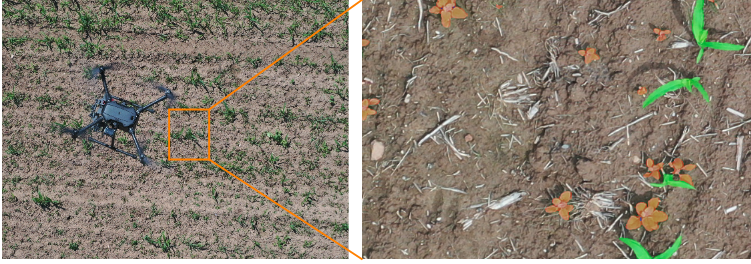We are conducting research in several funded projects. You can find more information about EWIS below. If you are interested in more details and discussions about our projects, do not hesitate to contact us.
For more information please contact Dominik Grimm.
Project Description
In agriculture, a significant amount of yield is lost due to weed plants that compete for nutrients, sunlight and water with the crops. Therefore monitoring of weed patches is a critical step within the agricultural production chain. A substantial amount of pesticides are sprayed onto fields, which have devastating negative effects on the environment. Precision Farming offers an unprecedented opportunity to automate and optimize processes in agriculture to manage agricultural fields more precisely based on their needs and lower the amount of pesticides.
The high-level goal of the project “Evaluation and Development of modern methods of Artificial Intelligence for Automatic Weed Detection in Sorghum using drones (EWIS)”, which is funded by the Bavarian State Ministry for Food, Agriculture and Forests (Bayerisches Staatsministerium für Ernährung, Landwirtschaft und Forsten), is to develop a resource-saving and efficient measure for weed control that is cheaper and faster than conventional weed management.

Innovative approaches and modern machine learning based methods will be investigated and developed to automatically and precisely detect various types of weed on agricultural fields. For this purpose, the growth of Sorghum – a energy plant used mainly in the production of biogas – is captured by unmanned aerial vehicles (UAV). These captures are then analyzed using modern machine learning methods (e.g. state-of-the-art deep learning architectures) to extract high level features. The methods are then applied to detect weed patches in future captures. Finally, the developed method will also be applied and evaluated on Zea mays to estimate its generalization abilities with respect to other cultivars. With this approach we might be able to reduce the usage of pesticides.
Project Information
Project title
Evaluation and development of modern methods of artificial intelligence for automatic weed detection in sorghum using drones
Involved people in our team
- Project Coordinator: Prof. Dr. Dominik Grimm
- Project Advisor: Nikita Genze
Funding
Bayerisches Staatsministerium für Ernährung, Landwirtschaft und Forsten
Project partner
Michael Grieb, Raymond Ajekwe, Technologie- und Förderzentrum TFZ; Dr. Wouter Vahl‚ Dr. Jennifer Groth, Institut für Pflanzenbau und Pflanzenzüchtung (IPZ) der Bayerischen Landesanstalt für Landwirtschaft (LfL)
Funding ID
G2/N/19/13
Publications
Deep learning-based early weed segmentation using motion blurred UAV images of sorghum fields.
N Genze, R Ajekwe, Z Güreli, F Haselbeck, M Grieb, DG Grimm
Computers and Electronics in Agriculture, Vol. 202, 2022
(https://doi.org/10.1016/j.compag.2022.107388) [Code] [Data]